The ‘Accidental Entrepreneur’ From Bengaluru Whose Brand Diverted Over 155,000 Kilos of Waste From Landfills
“I needed the job, not just for the money, but to feel like I mattered again,” says Saraniya, a production assistant at Bare Necessities.
After a decade-long break from work, during which she cared for her ill mother and raised her young son, she found herself uncertain about the future. “My son has speech difficulties, and our family has been through a lot. I was not sure I would ever get another chance. But the brand gave me one, and it changed everything.”
Her story is strongly connected with the vision of another woman, one who, too, was searching for meaning and impact. Growing up in Bengaluru, Sahar Mansoor was always passionate about environmental issues. Even as a child, she was obsessed with waste and looked for ways to manage it in the best way possible. “I was always that child who wanted to recycle, reuse, and reduce,” she laughs.
Later, her passion took her across the world to the University of Cambridge, where she completed her studies in environmental law and environmental economics, graduating in 2014. She went on to work with global institutions like the United Nations and the World Health Organisation (WHO) in Geneva. Despite the important work she did in these roles, she began to feel disconnected. “I wanted to do something that had a more tangible impact,” she explains. “I was working on policies, but I wanted to see and feel the change on the ground.”
The reality of India’s waste pickers
Her desire to create direct impact brought her back home to Bengaluru in 2015, where she joined the SELCO Foundation, focusing on decentralised solar energy solutions for underserved communities. During this time, she began to shadow waste picker communities across the city, an experience that proved to be life-altering for her.
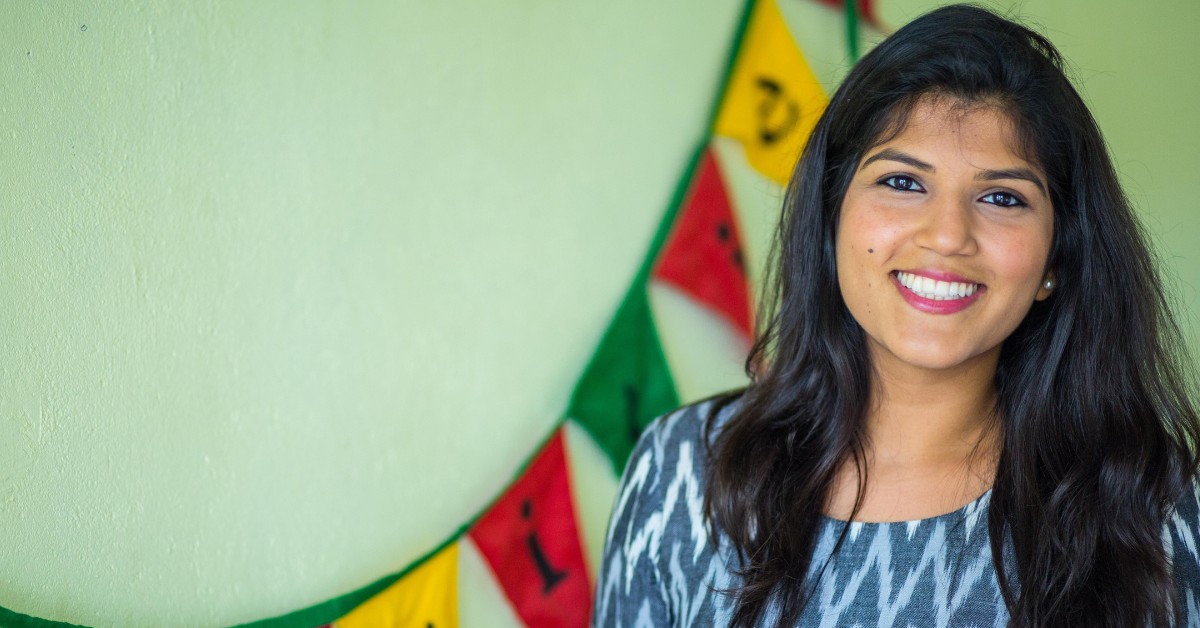 Sahar Mansoor began to shadow waste picker communities across the city during her work at the SELCO Foundation
Sahar Mansoor began to shadow waste picker communities across the city during her work at the SELCO Foundation
“I was horrified by what I saw,” she recalls. “Waste pickers were sorting through broken glass, soiled sanitary pads, and syringes with their bare hands. Some had lost their thumbs to cuts from sharp objects. These were people with no gloves, no protection, and no support. Meanwhile, we were going about our personal hygiene routines, tossing waste without a second thought,” she tells The Better India.
This powerful contradiction, between cleanliness and filth, privilege and vulnerability, struck Sahar deeply. “I don’t want to be part of the problem anymore,” she says. “I wanted to opt for a lifestyle that was kind, both to the planet and to people.”
She turned to her roots. In conversations with her grandmother, she explored what life looked like before plastics and chemical-filled toiletries. “I asked her what she used before shampoo came in a bottle, and she told me about traditional ingredients like shikakai, neem, and coconut oil. That’s where the idea began.”
While continuing her work at SELCO, at just 24, she began creating her zero-waste personal care products in her mother’s garage in 2016. She learnt how to make soaps, moisturisers, and balms through a mix of online and offline courses, and began selling her handmade goods at pop-ups and workshops.
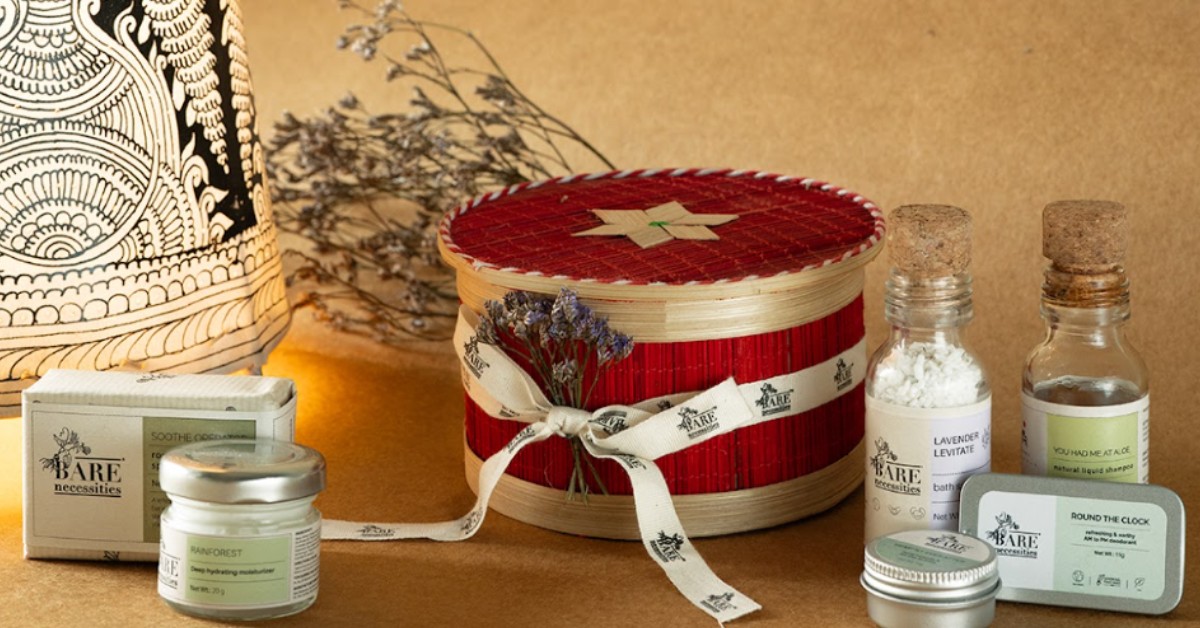 Bare Necessities is a brand that focuses on zero-waste living and promotes the empowerment of women
Bare Necessities is a brand that focuses on zero-waste living and promotes the empowerment of women
“I did not have a background in business, and becoming an entrepreneur was never part of the plan. I often call myself an ‘accidental entrepreneur’,” she says with a smile. “I was young, optimistic, and perhaps a little naive, but in many ways, that worked in my favour.”
Not just another skincare brand by the ‘accidental entrepreneur’
The venture began to gain momentum, and by 2019, the young entrepreneur officially registered ‘Bare Necessities’ as a private limited company, dedicating herself fully to building a brand rooted in her core values, that is, zero-waste living, natural ingredients, ethical sourcing, and the empowerment of women.
At first glance, the startup may seem like just another sustainable skincare brand. But it is far more than that. It represents a radical rethinking of everyday consumption and a commitment to social and environmental justice.
“We want to provide alternatives for everything you use from the moment you wake up to when you sleep, without plastic, and with a conscience,” the entrepreneur explains.
Their products include bamboo toothbrushes with colour-coded tips and tactile icons for the visually impaired; natural shampoo and conditioner bars that last over 70 washes; moisturisers, lip balms, multi-surface cleaners, and dishwashing powders.
All are designed with innovative, waterless formats; for instance, their ‘Stir It Up’ handwash contains just 10% active ingredients, leaving users to add water at home, drastically reducing packaging waste and carbon emissions.
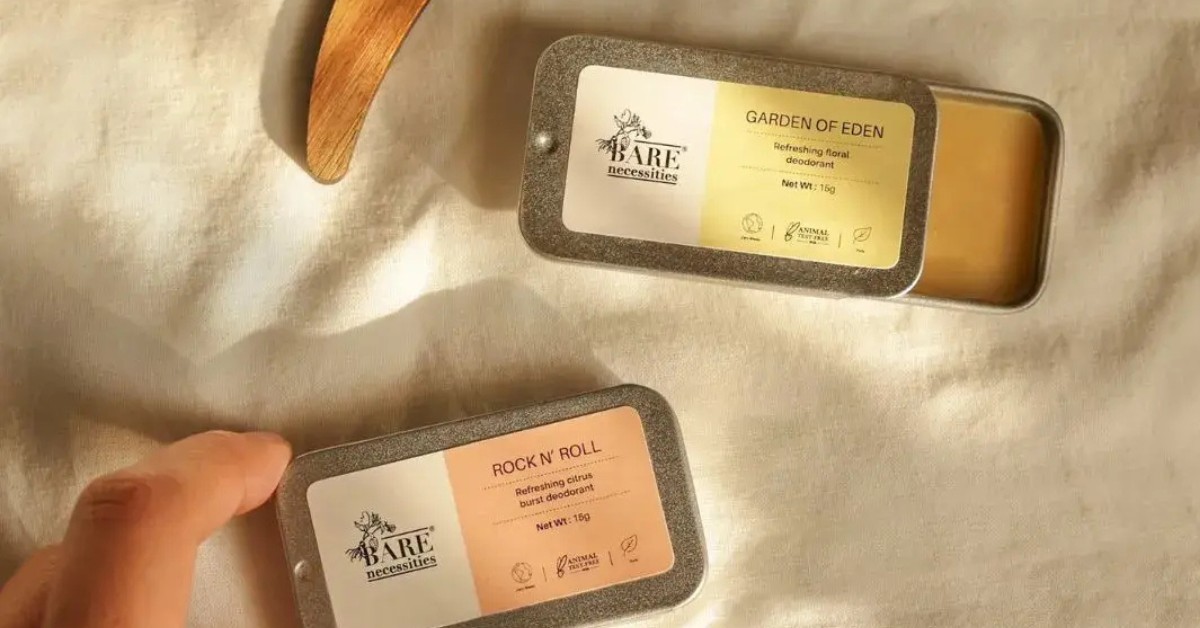 Every product is carefully crafted with natural and non-toxic ingredients, and they are sourced from across India
Every product is carefully crafted with natural and non-toxic ingredients, and they are sourced from across India
Every product is carefully crafted with natural and non-toxic ingredients, mindfully sourced from across India. From fragrant lavender harvested in the valleys of Kashmir and pure coconut oil from the coasts of Kerala, to rich cacao butter from Auroville and nutrient-dense moringa renowned for its hair-strengthening benefits, the brand is committed to sourcing the finest ingredients.
“In the early days, I travelled across India to meet vendors in person,” Sahar shares. “We now work with over 100 suppliers, all of whom follow our supplier code of conduct, which prohibits child labour and insists on low-waste practices.”
Handmade with love: Inside the R&D lab
Formulations are developed and tested in a small R&D lab within the Bengaluru-based office on Bowring Hospital Road, which also houses the production unit and warehouse. The products, especially their soaps, are handmade using the cold-process saponification method, blending cold-pressed oils like sunflower or coconut oil with natural clays such as green and pink clay, and essential oils for fragrance.
The entrepreneur is clear about her intentions. “Most of the fast-moving consumer goods (FMCG) industry focuses on cheap and plastic-laden products filled with microplastics and water. We want to show that effective, luxurious products don’t have to come at the planet’s expense,” she emphasises.
And they have made an impressive environmental dent. Since their inception in 2016, Bare Necessities has:
- Sold over 241,805 products
- Saved more than 68.8 million units of single-use plastic from entering the environment
- Diverted over 155,816 kilograms of waste from landfills and water bodies
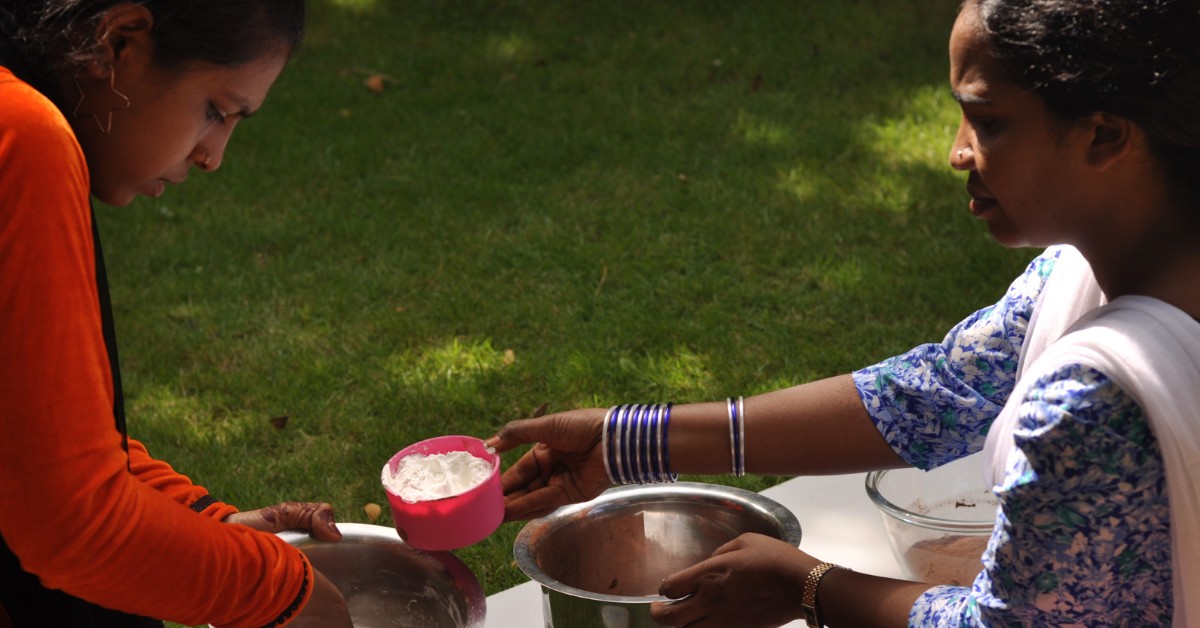 Formulations of the products are developed and tested in a small R&D lab within the Bengaluru-based office
Formulations of the products are developed and tested in a small R&D lab within the Bengaluru-based office
Their impact is measured in line with the UN Sustainable Development Goals, and the brand operates with a triple bottom line, prioritising people, planet, and profit in every decision. In recognition of their efforts, it became India’s first B Corp-certified FMCG company and has secured certifications from PETA, ISO (9001, 14001, 45001), Cosmetic GMP, and more.
Behind the products, a sisterhood in action
But for Sahar, who is in her early 30s and has built the brand from scratch at a young age, the heart of the business remains with the people, particularly the women who power it. “Our production and warehouse team is 100% women-run,” she says proudly. Most of them had never held jobs or had to quit to care for their families. Today, they are setting up their bank accounts, supporting their children’s education, and becoming financially independent.”
This journey has opened new doors for Saraniya and empowered her with skills and confidence that will serve her well in the future. “When I joined, I started learning to make the ‘Soak It Up’ moisturiser and soaps,” she says. “Now I can make deodorants, lip balms, and shampoo bars, and I even train others. It has been such a beautiful journey.”
She reflects on how the company has shifted her values. “I have learnt so much about sustainability, and I never waste food or water now. I see every resource as precious. Bare Necessities taught me that.”
More than that, it gave her community. “The women here are amazing. Everyone’s so grounded and compassionate. It helped me see that I am not alone in my struggles.”
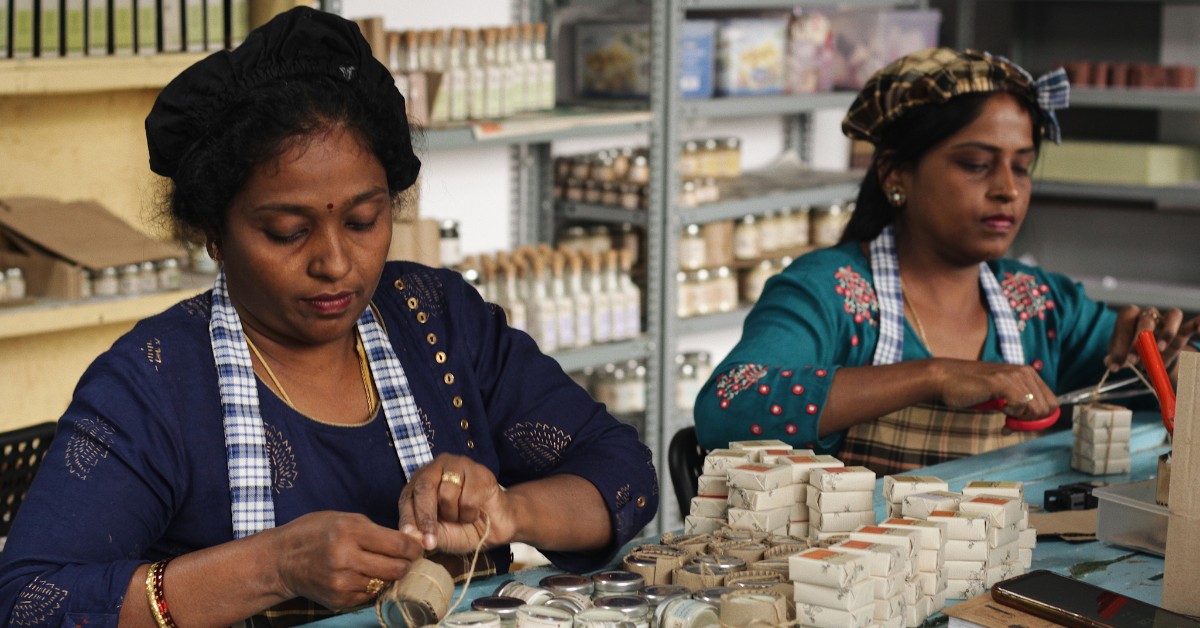 The production and warehouse team of the startup is 100% women-run
The production and warehouse team of the startup is 100% women-run
Similarly, for Veena Suryanarayan, joining the company marked more than just the start of a career, it helped to shift her perspective. She shares, “I was born in Mumbai and raised in Bengaluru, which I now call home.” With a background in political science, journalism, and economics, she had long been interested in how systems and stories shape the world. When she spotted a job posting for a Communication Executive at Bare Necessities, she did not think twice.
“It was my first job, and I could not have asked for a better place to begin. It gave me financial stability and purpose, something I value,” she says. Now Brand Marketing and Communications Supervisor, her role spans everything from customer relations and content creation to managing press and impact reports.
Working in a small and dynamic team, she has embraced the chance to grow. “I have led workshops for our women’s team on savings and financial discipline. It felt empowering to share what I have learnt,” she adds.
Being immersed in the brand’s mission also changed her habits. “I have switched to reusables, and when I moved into my new place, one of the first things I did was set up a home composter. These shifts happened gradually, but they have stayed,” she says.
What mattered most, though, were the people. “There is real camaraderie here, the kind that makes every day feel worthwhile. I have learnt far more than what’s in my job description. Sustainability, yes, but also how to live with intention and purpose,” says the employee.
From garage to Amazon: The brand’s expansion over the years
From a garage start-up to a nationally recognised sustainability brand, Bare Necessities is growing steadily. They now serve customers both directly (D2C) via their website and platforms like Amazon and Flipkart, and businesses (B2B) through corporate gifting and bulk orders.
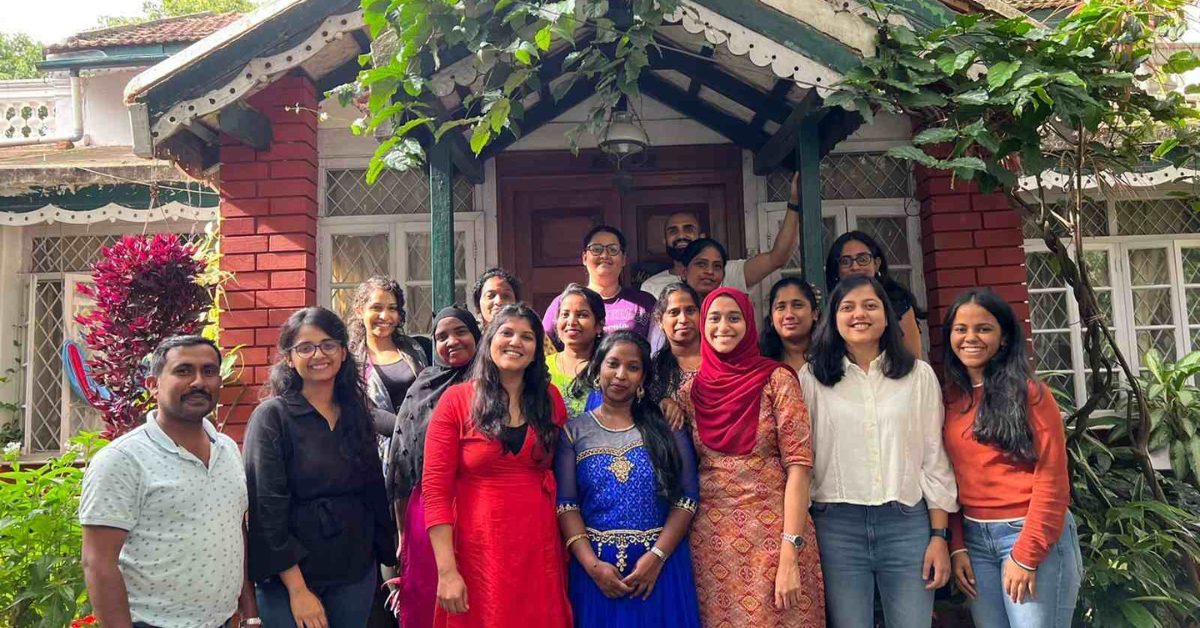 The entire team at Bare Necessities supports each other and is dedicated to manufacturing eco-friendly products
The entire team at Bare Necessities supports each other and is dedicated to manufacturing eco-friendly products
Recently, they have also been onboarded to quick commerce platforms, making their eco-friendly essentials even more accessible.
Deepika Prabhakar, a 35-year-old special educator, has always been mindful of what she uses, especially due to her sensitive skin. “I am an animal lover, and I enjoy fun skincare products as well as innovative and natural cleaning solutions that are gentle yet effective,” she says.
She first came across Bare Necessities at an exhibition. “The brand’s natural and sustainable approach immediately drew me in, especially since I had experienced several allergic reactions to traditional soaps. I was on the lookout for a gentler alternative, and the products felt like the perfect fit. It not only helped with my skin allergies but also intrigued my curiosity with its variety and creative combinations,” she explains.
Deepika particularly resonates with the company’s commitment to zero waste.
“The packaging is compact and convenient, allowing for a lot of repurposing, which is a thoughtful touch. Sustainability and ethical sourcing are like the icing on the cake,” she adds.
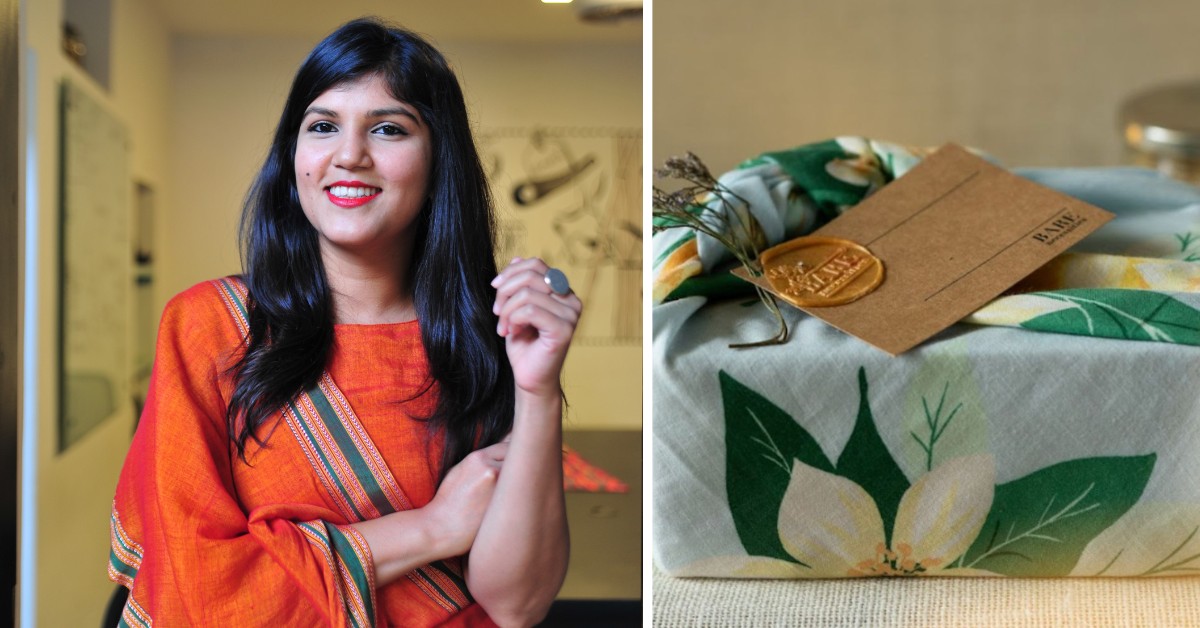 Even though Sahar’s startup was not planned, it is aiming to solve a major problem in India
Even though Sahar’s startup was not planned, it is aiming to solve a major problem in India
“The scents are subtle but leave a lovely fragrance behind, which is ideal for me, as I am prone to headaches. I absolutely love the variety of soaps; they cater to different skin concerns and work really well,” she continues.
Using the products has also made her more conscious of her consumption choices. “I have become more aware of what I buy and use. The startup’s educational ads have helped me refocus on more ethical and sustainable brands. I also enjoy the helpful recommendations on their Instagram page, which introduce me to new product categories. I admire how they are actively educating kids about sustainability,” she says.
Their broader social commitments include partnerships with Hasiru Dala, an NGO supporting waste picker communities, and Maruvan, a reforestation group in Rajasthan. Customers are encouraged to donate to these causes at checkout, making every purchase a part of something bigger. “When you witness injustice up close, you can’t unsee it. I had to act. My startup was not planned; it was a response to what I saw and a belief that we could do better,” Sahar reflects.
Edited by Vidya Gowri; All pictures courtesy Bare Necessities
News